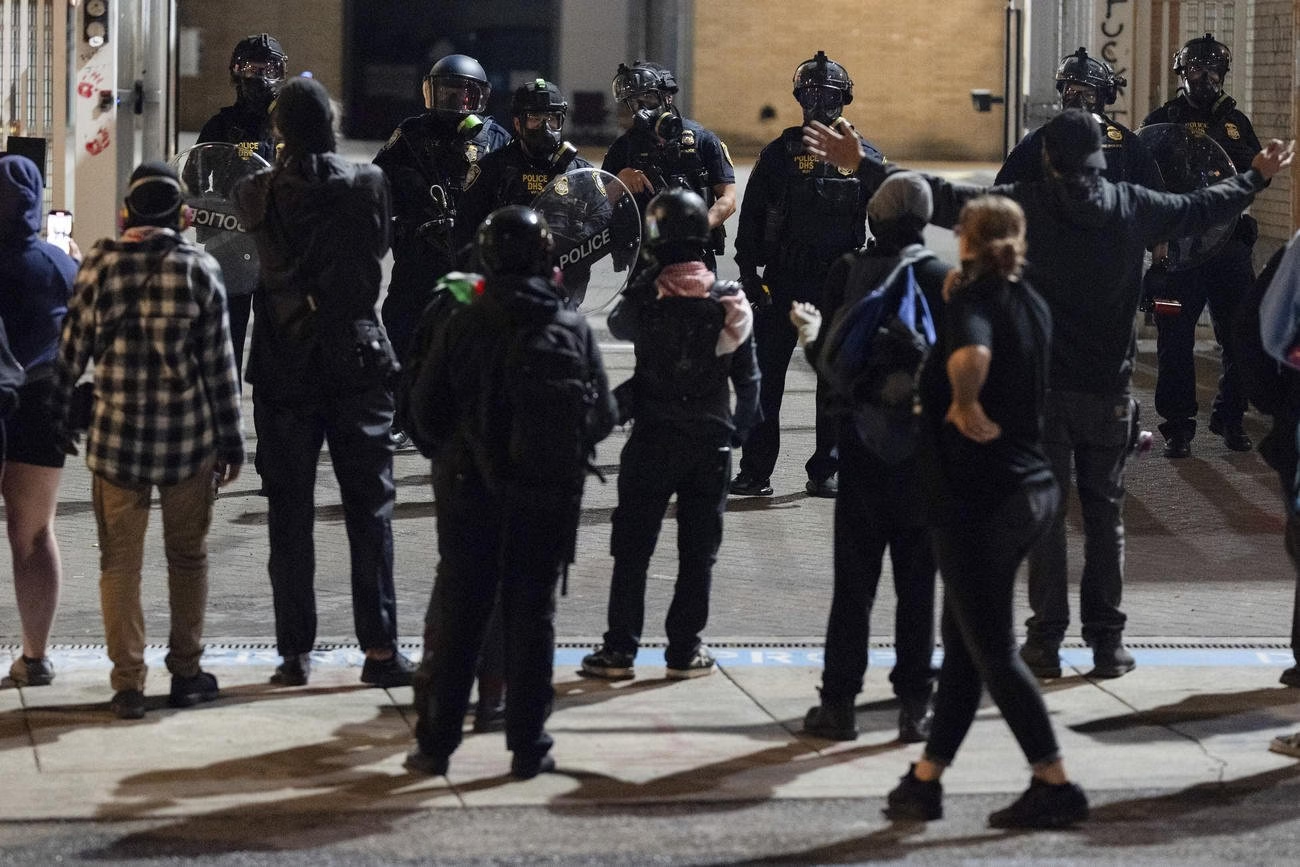Colonel restricted whistleblowing soldier’s rights after Red Hill leak

An Air Force colonel illegally restricted an Army major from contacting a member of Congress about the health impacts she and her family faced from jet-fuel-laced drinking water in Hawaii, a federal watchdog found.
The Pentagon Inspector General found that Air Force Col. Kenneth McAdams’ efforts to discourage Army Maj. Amanda Feindt from communicating with Congress as part of her advocacy efforts around the Red Hill fuel leak and water contamination crisis constituted an illegal restriction. Military members have the right to communicate with Congress and the IG under federal laws that protect whistleblowers
“[McAdams’] rank and position of authority, combined with apparent reference to congressional engagement being the source of negative actions and display of a dismissive attitude and demeanor toward concerns, would deter a reasonable service member from lawfully communicating with a member of Congress or an IG,” the IG found on Feindt’s interactions with McAdams.
The actions of McAdams that the IG found to constitute illegal interference came in a meeting between the two officers in early 2022. Feindt was in touch with at least one member of Congress at the time of the meeting and continued to be after the meeting.
McAdams was chief of staff for U.S. Special Operations Command Pacific in Hawaii from July 2020 through June 2023 and was Feindt’s senior rater for performance evaluations. Feindt was assigned to the command’s directorate for personnel issues in July 2021. McAdams’ evaluation came ahead of Feindt’s promotion board for lieutenant colonel.

McAdams’ name is redacted from the IG report, but an IG official confirmed his identity in a letter to Feindt’s lawyer sent at the conclusion of the investigation. McAdams retired from the Air Force and did not participate in the IG’s investigation. The IG recommended that the service “consider appropriate action” against McAdams for restricting Feindt’s communications. He did not respond to a request for comment sent by Task & Purpose.
An Air Force spokesperson told Task & Purpose that the service reviewed the IG report and is “considering appropriate action.”
In 2021, more than 20,000 gallons of fuel leaked into local drinking water, exposing more than 93,000 people at the Joint Base Pearl Harbor-Hickam, Hawaii and surrounding communities to toxic chemicals. A command investigation on the spill detailed a series of failures and mistakes by Navy officials which contributed to the Red Hill incident and acknowledged that breakdowns in leadership and communication caused military families to mistrust the Navy’s ability to handle the crisis. Military families, including Feindt’s, have sued for damages over the incident, describing various health effects linked to the contamination including fatigue, seizures, burns, and gastrointestinal disorders.
Feindt told Task & Purpose that the IG’s findings are somewhat vindicating “because it’s no longer my word against theirs,” and that she wanted to give hope to other whistleblowers who oftentimes give up on getting justice because “they know that the system will not work for them” and it’s “set up to protect the command.”
At the same time, receiving the validation three and a half years after the fact comes with the reality of the effects that speaking out has had on her career.
“I can’t tell you how hurtful and just morally degrading it’s been to watch all of my peers get promoted,” she said. “To know that had I remained silent, I would have been a lieutenant colonel two years ago. This will impact my pension. It’ll impact the money that goes in my pocket. It impacted my credibility. My professional reputation has just been dragged in the mud.”
Toxic exposure
Feindt shared her family’s story with Task & Purpose in January 2022, in which she described her family’s symptoms of dizziness, nausea, fatigue, headaches, diarrhea, and extreme abdominal pain after drinking water contaminated by the spill. In May, a federal judge awarded the family about $61,000 in damages for their pain and suffering from the contamination.
Feindt’s family is still dealing with health issues and has had hundreds of medical visits over the years. Her son has permanent lung damage from inhaling fuel fumes. Her husband, Patrick, has had three gastrointestinal surgeries.
Feindt is being treated for an environmental traumatic brain injury and related symptoms like vestibular dysfunction and lightheadedness. She has also been prescribed hearing aids for hearing loss that her military doctors have linked to toxic exposure. Research has found that jet fuel exposure can contribute to auditory processing issues and exacerbate hearing loss.

She is currently assigned to a soldier recovery unit at Fort Belvoir, Virginia, and is set to medically retire next year. Feindt has 19 years worth of active duty Army service.
Feindt joined a separate lawsuit with other active-duty troops challenging the Feres doctrine — a 75-year-old court ruling that prevents service members from suing the government for service-related harm. That case has not yet gone to trial.
Under direction from Congress, the National Academies of Sciences, Engineering, and Medicine launched a study on the human health impacts of the Red Hill spill. Feindt said this study will be a step towards getting toxic exposures like Red Hill covered as a presumptive condition for Department of Veterans Affairs healthcare, a growing issue in Congress.
A fuel spill and reprisals at work
On Dec. 9, 2021, Feindt reported to her supervisor that her Ford Island home had been affected by the fuel spill and believed it was the reason for her family’s health problems. They were evacuated from their military housing on Dec. 13, and checked into a hotel.
In the following months, Feindt positioned herself as a public face for families affected by the toxic water supply, including outreach to members of Congress. But, the inspector general found, it also began a series of escalating run-ins with her chain of command.
The IG found that, within weeks of being evacuated from base housing, Feindt communicated with staff members from the Veterans Affairs Committee and Sen. Brian Schatz’s team (D-Hawaii) about her family’s health and her daughter’s daycare on base continuing to use plastic after local health officials warned it could still be hazardous because of the water contamination.
Also in December 2021, Feindt emailed 20 service members from her unit, including McAdams, that she would “take a brief pause” from work duties to handle personal matters related to the spill and that she was “heavily involved” in fuel spill advocacy using her “family’s story to represent hundreds” of others who were impacted. She noted that she was communicating with Congress, military and local officials, media outlets, according to the report.

At a Task Force Ohana town hall on Jan. 6, 2022, a sergeant major stated that troops needed to get back to work. Feindt told the sergeant major that she was taking care of her children at a hotel because she did not have childcare.
Over the next month, the report found, Feindt received oral and written counseling because of a “combative” interaction with military teams who were sent to flush contaminated water from base homes. She had recorded the encounter and posted it to Facebook which leadership said violated three Uniformed Code of Military Justice articles. She was also counseled for overdue work tasks.
Feindt went on leave for most of February.
On Feb. 10, 2022, a co-worker emailed McAdams a link to an Air Force Times story with Feindt’s picture at the top and mentions of her meetings with Congress. The email mockingly labeled Feindt’s media appearances as “escapades.”
By Feb. 25, 2022, Feindt returned to work and had a meeting with McAdams to discuss the counseling, believing “she was in a hostile work environment,” the report says. She told the inspector general that McAdams told her “[it] was all of my fault, that I brought this all on myself.” When she asked what that meant, he pointed to her meetings with Congress, the recorded video posted online and the discussion with leadership at the base town hall.
Feindt recalled telling McAdams that she would’ve done the same thing for his and other families impacted by the water contamination to which he “responded that the difference was that no one asked [Feindt] to be a ‘self professed superhero.’”
McAdams did not participate in the IG report. Task & Purpose tried to reach McAdams for this story but was unsuccessful.
‘Bury your head in the sand’
Feindt believed McAdams’ used his position as her rater to discourage her from actions covered by whistleblower rules.
“What I took from the conversation is: If you stop doing all of these things that you’re doing to protect yourself and your family, then things can go back to being normal,” she told the IG.
“And [he] said it wasn’t my job. That none of these things that I was doing [were] part of my job description.”
According to the report, Feindt recalled it as a “negative, hostile conversation” and that she was excused from the meeting when she broke into tears. Three days later she filed a complaint of reprisal with the Department of Defense IG, which resulted in the investigation.
“The people who were actually in charge of the crisis or the response have never been held accountable,” Feindt said. “The only people who’ve been held accountable are your whistleblowers.”
In September 2023, five Navy admirals received non-judicial punishments for their role in the Red Hill spill. The Department of Defense has not officially fired any senior leaders over the Red Hill crisis.
In a 60 Minutes interview in August 2024, Meredith Berger, former assistant secretary of the Navy for installations was asked about accountability for the Red Hill, since all of the leadership at the time of the spill have been able to retire or be reassigned.
“It’s accountability within the system that we have established,” Berger said. “We have heard that this was too long and that maybe it didn’t go far enough.”
Feindt worked as a human resources officer and said she’s witnessed retaliation from the sidelines but never dealt with it herself. She said it’s changed the way she views the institution that she was willing to put her life on the line for.
“This time, money and effort that we put into the messaging about ‘people are our greatest assets’ and ‘if you see something, say something,’ it reads really well, but when sh–t actually hits the fan, when push comes to shove, when there’s an actual situation where you would actually apply those slogans, I’ve found that it’s not actually true,” she said. “What we really want you to do is bury your head in the sand, shut up and color, and fall in line. If you don’t, a target will be placed on your back and we will make your life a living hell.”














